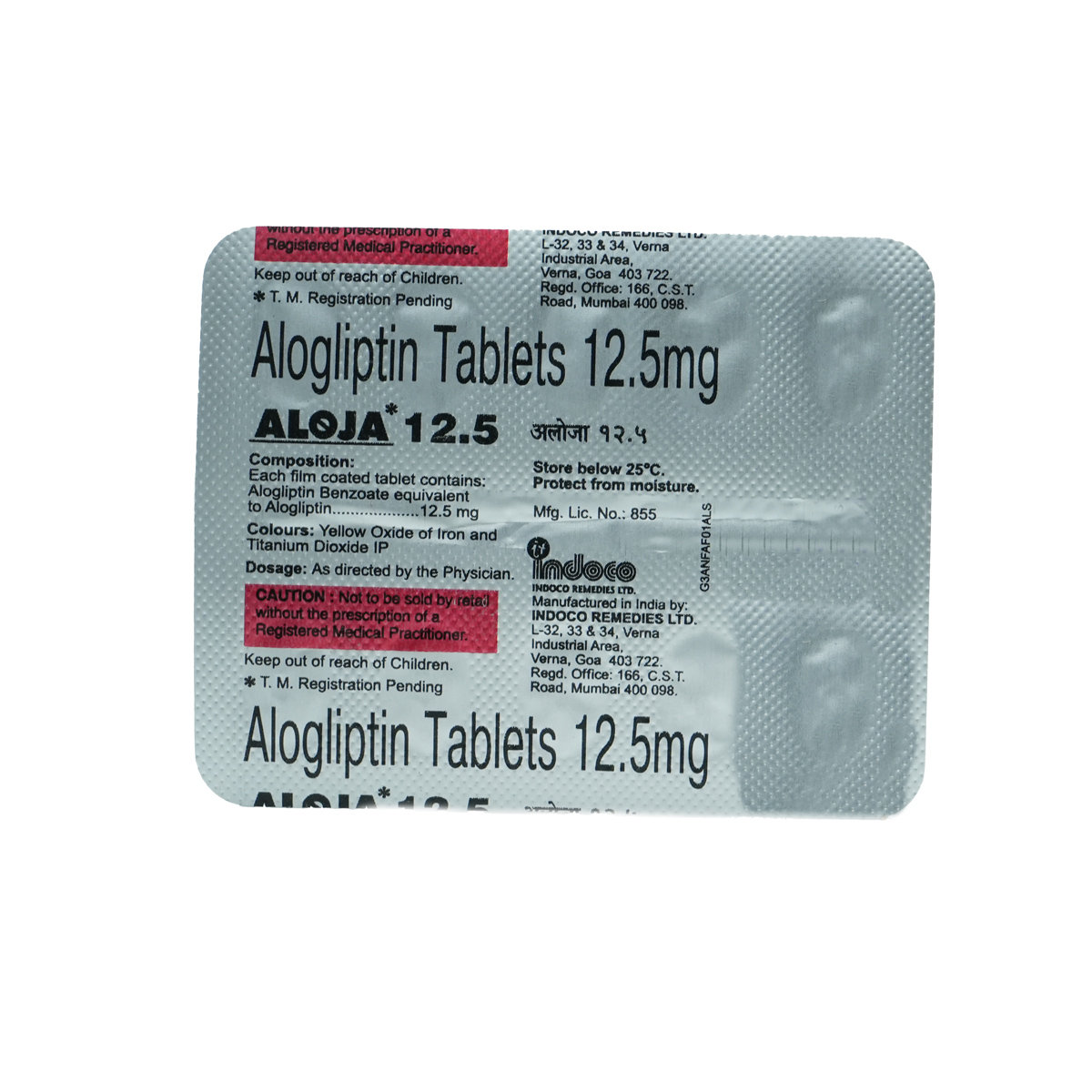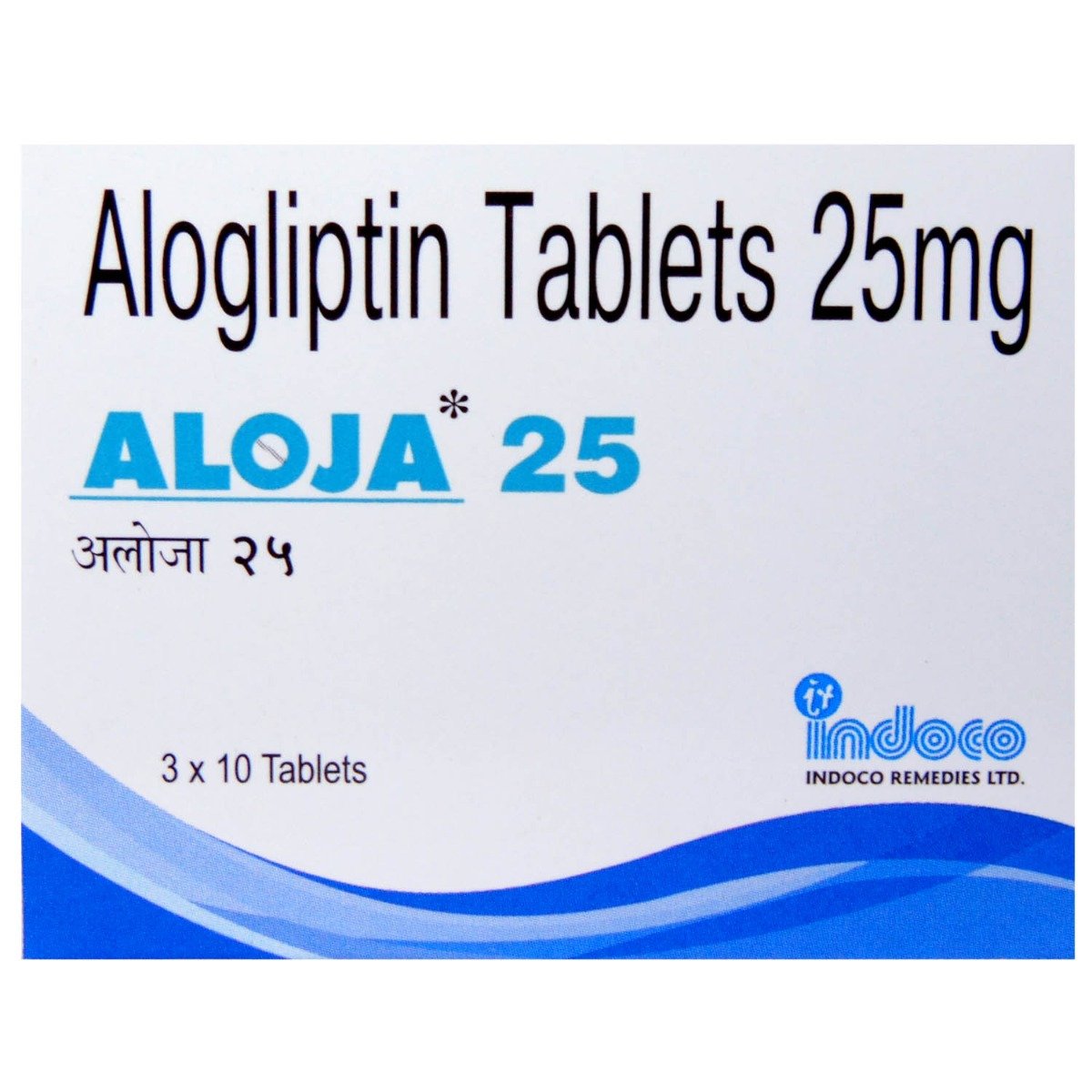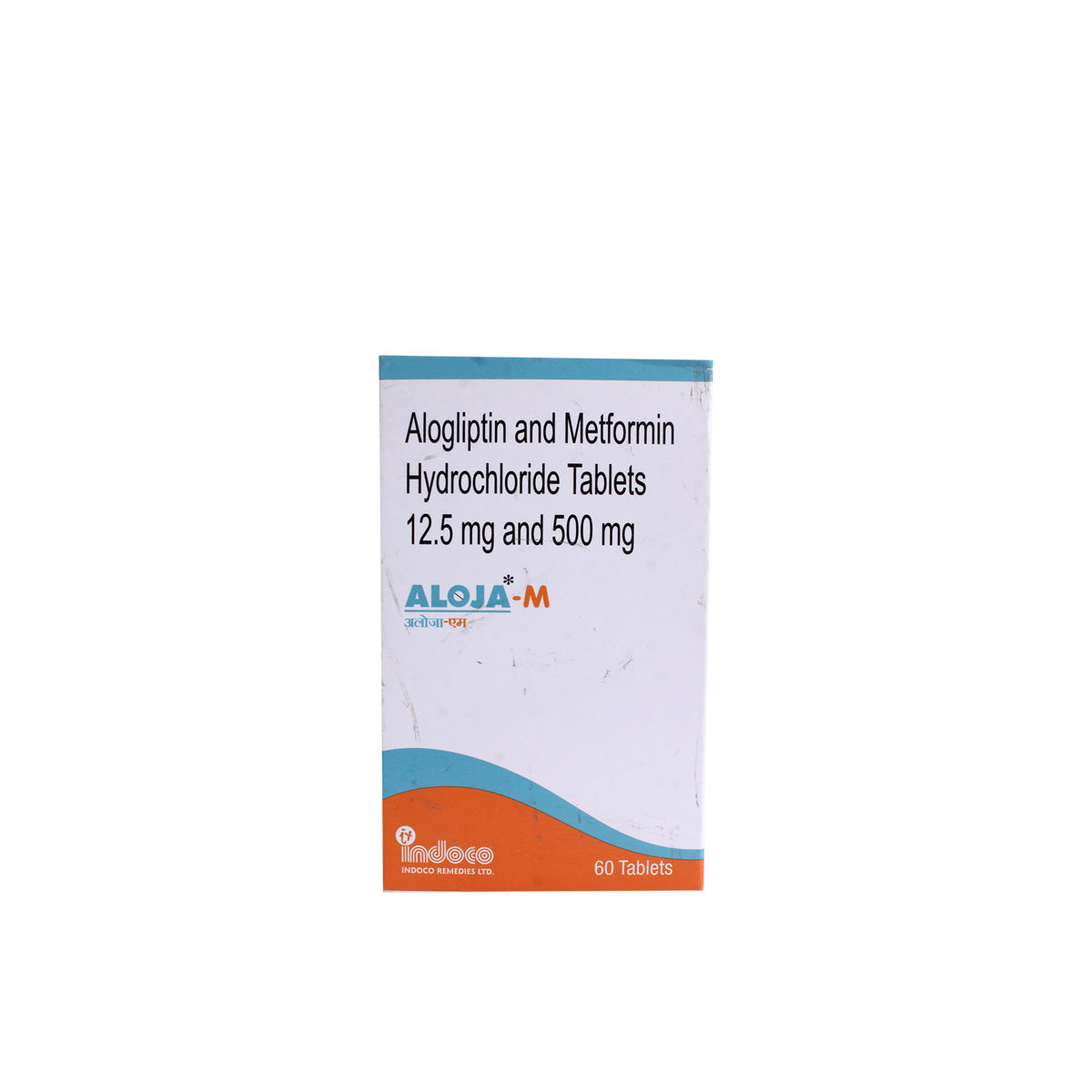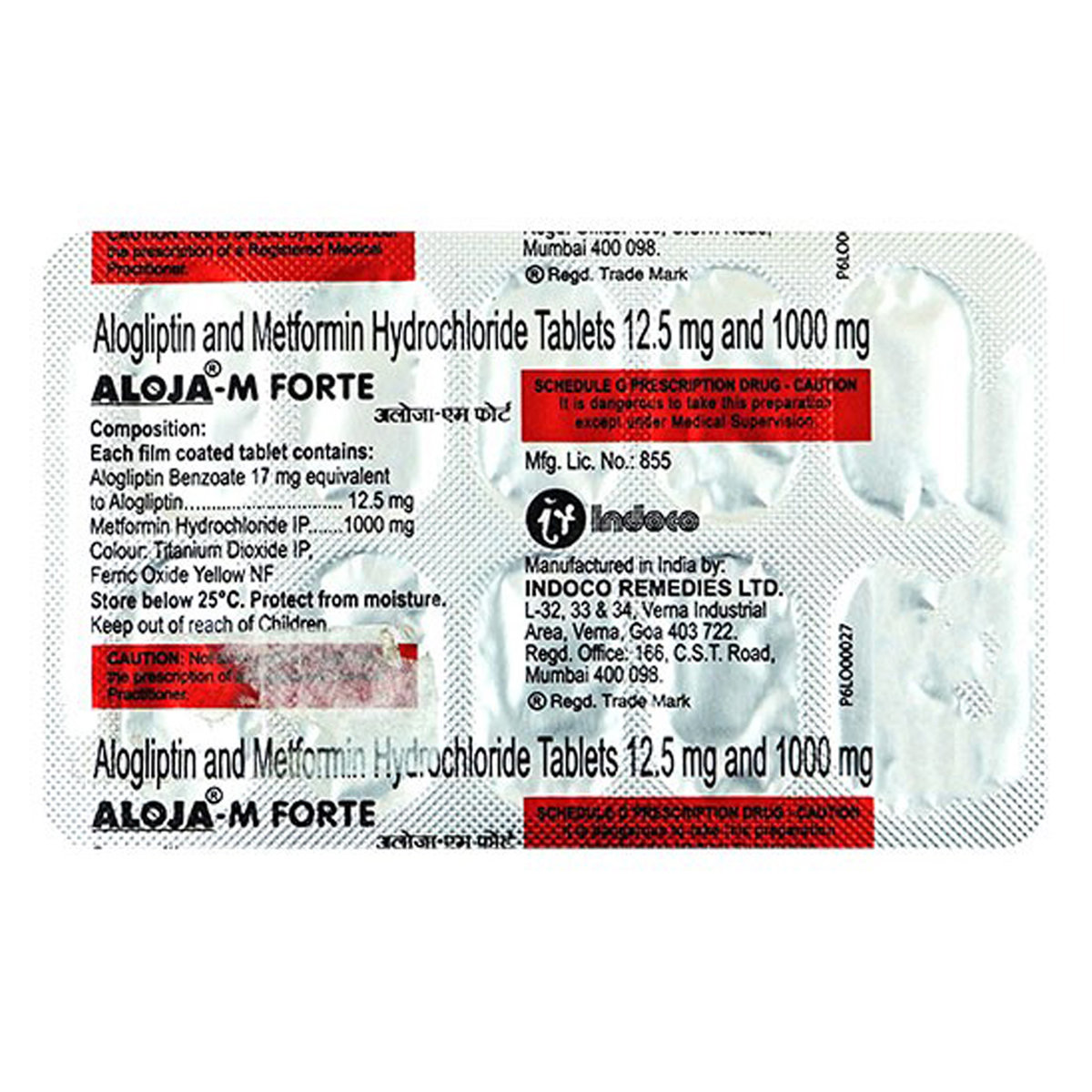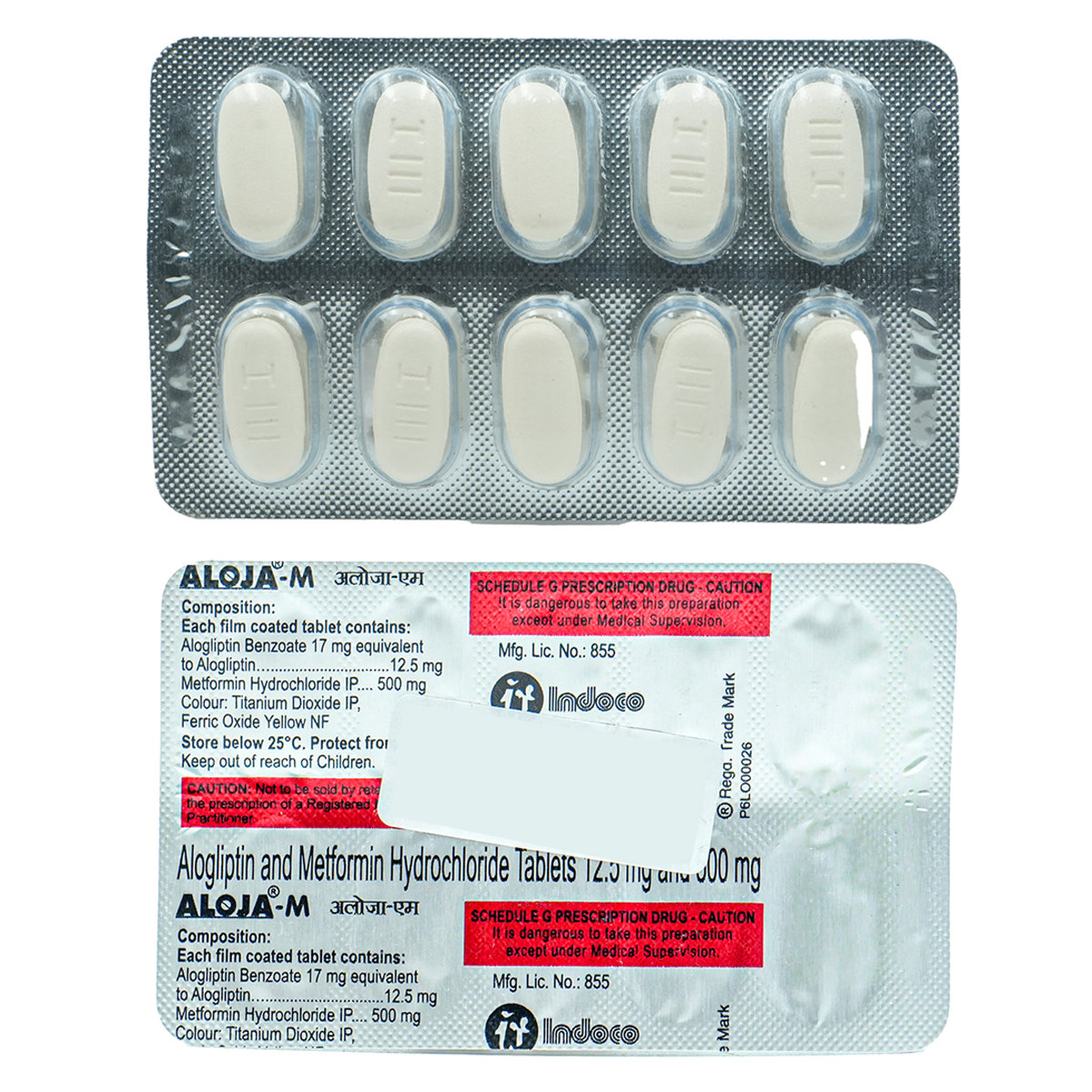Alogliptin
About Alogliptin
Alogliptin is used in the treatment of type 2 diabetes, especially in patients whose blood sugar levels are not controlled by diet and exercise alone. Alogliptin may be used alone or in combination with other medicines. Type 2 diabetes is a chronic (long-lasting) condition that affects the way the body processes glucose. People with type 2 diabetes either do not produce enough insulin, or the insulin produced is unable to perform its function in the body (insulin resistance).
Alogliptin contains Alogliptin that works by binding to the dipeptidyl peptidase-4 (DPP-4) enzyme in the body and prevents the breakdown of glucagon-like peptide-1 (GLP-1) and glucose-dependent insulinotropic peptide (GIP) hormones that control blood sugar levels. Thereby increasing the levels of these two hormones. GLP-1 and GIP are released after a meal and stimulate the production of insulin (the main hormone that controls blood sugar levels) by the pancreas when the glucose levels are high in the blood. Also, GLP-1 decreases glucagon (a hormone that increases sugar production by the liver) production. Thus, Alogliptin helps in controlling blood sugar levels.
Take Alogliptin as prescribed. You are advised to take Alogliptin for as long as your doctor has prescribed it based on your medical condition. In some cases, you may experience headaches, symptoms of low blood sugar levels (sweating, blurred vision, anxiety), heartburn, diarrhoea, stomach pain, indigestion and cold-like symptoms (blocked or stuffy nose, sore throat). Most of these side effects of Alogliptin do not require medical attention and gradually resolve over time. However, if the side effects persist or worsen, please consult your doctor.
If you are allergic to Alogliptin or any other medicines, please tell your doctor. Alogliptin is not recommended for children below 18 years of age. If you are pregnant or breastfeeding, please inform your doctor before taking Alogliptin. Avoid alcohol consumption with Alogliptin as it may increase or decrease blood sugar levels. Take short, frequent meals and avoid prolonged fasting when taking Alogliptin. Whenever you experience symptoms of low blood sugar such as sweating, dizziness, palpitations, shivering, intense thirst, dry mouth, dry skin, frequent urination, etc., immediately consume 5-6 candies or 3 glucose biscuits or 3 teaspoons of honey/sugar and also consult your doctor.
Uses of Alogliptin
Medicinal Benefits
Alogliptin contains Alogliptin, an anti-diabetic drug used to treat type 2 diabetes, especially in patients whose blood sugar levels are not controlled by diet and exercise alone. Alogliptin prevents the breakdown of incretin hormones, namely: glucagon-like peptide-1 (GLP-1) and glucose-dependent insulinotropic peptide (GIP) that control blood sugar levels. This increases the levels of these two hormones, which are released after a meal. Alogliptin increases insulin production by the pancreas and decreases glucagon production by the liver. Thus, it helps to control blood sugar levels and prevent further complications due to diabetes. A proper diet, regular exercise, and Alogliptin will give better results.
Directions for Use
- Alogliptin can be taken with or without food as advised by the doctor.
- Follow your doctor's instructions on the dosage and timing to ensure effectiveness.
- Swallow Alogliptin as a whole with a glass of water.
- Do not crush, chew, or break it.
Storage
Side Effects of Alogliptin
Headache
Symptoms of low blood sugar levels (sweating, blurred vision, anxiety)
Heartburn
Diarrhoea
Stomach pain
Indigestion
Cold-like symptoms (blocked or stuffy nose, sore throat)
Drug Warnings
If you are allergic to Alogliptin or any other medicines, please tell your doctor. Alogliptin is not recommended for children below 18 years of age. If you are pregnant or breastfeeding, please inform your doctor before taking Alogliptin. Avoid alcohol consumption with Alogliptin as it may alter blood sugar levels. Alogliptin is not recommended for patients with diabetic ketoacidosis and type-1 diabetes. Take short frequent meals and avoid prolonged fasting when taking Alogliptin. Beware of symptoms of hypoglycaemia (low blood sugar) which include sweating, dizziness, palpitations, shivering, intense thirst, dry mouth, dry skin, frequent urination etc. Whenever you experience any of the above-mentioned symptoms, immediately consume 5-6 candies, 3 glucose biscuits or 3 teaspoons of honey/sugar and also consult your doctor. Make sure to carry these with you at all times, especially during long travels.
Drug Interactions
Drug-Drug Interaction: Alogliptin may interact with other anti-diabetic drugs (glibenclamide, glipizide, tolbutamide, insulin).
Drug-Food Interaction: Alogliptin may interact with alcohol. Therefore, avoid consumption of alcohol with Alogliptin as it may lead to high or low blood sugar levels.
Drug-Disease Interaction: If you have type 1 diabetes, diabetic ketoacidosis (excessive levels of blood acids called ketones), disease of pancreas, kidney, liver or heart problems, inform your doctor before taking Alogliptin.
Drug-Drug Interactions Checker List:
Safety Advice

Alcohol
unsafeYou are recommended to avoid consumption of alcohol with Alogliptin as it may cause high or low blood sugar levels.

Pregnancy
cautionPlease consult a doctor if you are pregnant or planning for pregnancy. Alogliptin is given to pregnant women only if doctor thinks the benefits outweigh the risks.

Breast Feeding
cautionIt is unknown whether Alogliptin is excreted in human milk. Therefore, it is given to breastfeeding mothers only if doctor thinks benefits are greater than risks.

Driving
caution$nmae is unlikely to affect your ability to drive. However, Alogliptin in combination with other medicines may cause low blood sugar levels. Therefore, drive only if you are alert.

Liver
cautionTake Alogliptin with caution, especially if you have a history of liver diseases/conditions. The dose may be adjusted by your doctor as required.

Kidney
cautionTake Alogliptin with caution, especially if you have a history of kidney diseases/conditions. The dose may be adjusted by your doctor as required.

Children
unsafeAlogliptin is not recommended for children below 18 years of age as the safety and effectiveness were not established.
Habit Forming
Diet & Lifestyle Advise
Do regular exercise such as cycling, walking, jogging, dancing or swimming for a minimum of 30 minutes per day. Invest at least 150 minutes of your week in exercise.
Maintain healthy body weight as obesity is also related to the onset of diabetes.
Maintain a low fat and a low sugar diet. Replace carbohydrates containing foods with whole grains, fruits and vegetables as carbohydrates turn to sugars leading to high blood sugar.
Avoid consumption of alcohol and quit smoking.
Patients Concern
Disease/Condition Glossary
Type 2 diabetes: It is a chronic (long-lasting) condition that keeps the body from properly utilizing insulin. Hence, people affected with type 2 diabetes either do not produce enough insulin, or there is resistance to the action of insulin. Middle-aged or older are most likely to suffer from type 2 diabetes, so it is also known as adult-onset diabetes. Symptoms of type 2 diabetes include increased thirst, frequent urination at night, slow wound healing, increased hunger, fatigue, and blurred vision. In some cases, there may be weight gain, while in rare cases, weight loss may be observed. The complication of type 2 diabetes also includes nerve problems, kidney problems, damaged retina of eyes or blindness, loss of limbs, sexual dysfunction, and an increased chance of heart attack or stroke.
FAQs
Alogliptin is used in the treatment of type 2 diabetes, especially in patients whose blood sugar levels are not controlled by diet and exercise alone.
Alogliptin contains Alogliptin, an anti-diabetic drug that works by preventing the breakdown of hormones that control blood sugar levels. Alogliptin increases insulin production by the pancreas and decreases glucagon production by the liver. Thus, helps to control blood sugar levels.
Caution is advised when you are taking Alogliptin with insulin as it may cause low blood sugar. Therefore, you are recommended to consult a doctor before using Alogliptin with other medicines so that the dose may be adjusted appropriately.
Alogliptin should be used with extreme caution in patients suffering from or who have a history of pancreatitis (swelling of the pancreas) as it may increase the risk of recurrent pancreatitis or worsen the condition. However, if you experience any symptoms such as vomiting, stomach pain or nausea, consult a doctor immediately.
Alogliptin alone does not cause low blood sugar levels. However, low blood sugar levels may occur if Alogliptin is taken along with other antidiabetic medicines, alcohol intake, severe exercise, delay or missed snacks or meals. However, if you experience any signs of low blood pressure such as dizziness, nausea, light-headedness, dehydration or fainting, please consult a doctor.
You are not recommended to stop taking Alogliptin on your own as discontinuing Alogliptin suddenly may cause recurring symptoms or worsen the condition. However, if you experience any difficulty while taking Alogliptin, please consult your doctor so that an alternate medicine may be prescribed.
Alogliptin is usually not associated with weight gain as a direct effect. If you notice any sudden weight gain while taking Alogliptin, it is advisable to consult your doctor.
If kidney function is normal, then Alogliptin is not bad for kidneys. However, Alogliptin should be used with caution if you already have a kidney problem. You may need dose adjustment based on your specific condition. Always follow medical advice for the safest use of Alogliptin.
Yes, it is still important to manage your diet and exercise while taking Alogliptin. Maintaining healthy food choices and regular physical activity are essential for effectively managing blood sugar levels, especially in people with type 2 diabetes. Consider consulting a dietitian for a tailored diet plan and aim for at least 30 minutes of exercise daily.
Alogliptin may cause serious side effects rarely. It may cause pancreatitis (intense abdominal pain, nausea) and heart failure (shortness of breath, swelling, rapid weight gain). Inform your doctor if you have heart or kidney problems before taking Alogliptin.
Take Alogliptin as long as your doctor recommends it, which may be for a long duration, potentially lifelong, based on your medical condition. So, do not stop Alogliptin without consulting your doctor.
If you miss a dose of Alogliptin, then take the missed dose as soon as you remember and if it is the time for the next dose, skip the missed dose and continue taking a regular dose. Avoid taking the double dose to make up for the missed one.
Alogliptin is generally safe for long-term use, particularly for managing type 2 diabetes, as long as it is under doctor's guidance. Regular check-ups are important to ensure its effectiveness. Do not self-medicate.
If you take more than the prescribed dose of Alogliptin, your blood sugar levels may drop too low (hypoglycemia). For mild hypoglycemia, symptoms like sweating or fast heartbeat can be treated with sugary foods (e.g., glucose candy or juice). Severe cases may lead to fits or unconsciousness which can be life-threatening. Therefore, do not exceed the recommended dose.
Alogliptin causes side effects such as headache, heartburn, diarrhoea, stomach pain, indigestion, and symptoms of low blood sugar levels. Please, consult the doctor if these persist longer.

